Ukrainians reckoning with 'complexity of history' after Hunka affair
CBC
Sun, October 1, 2023
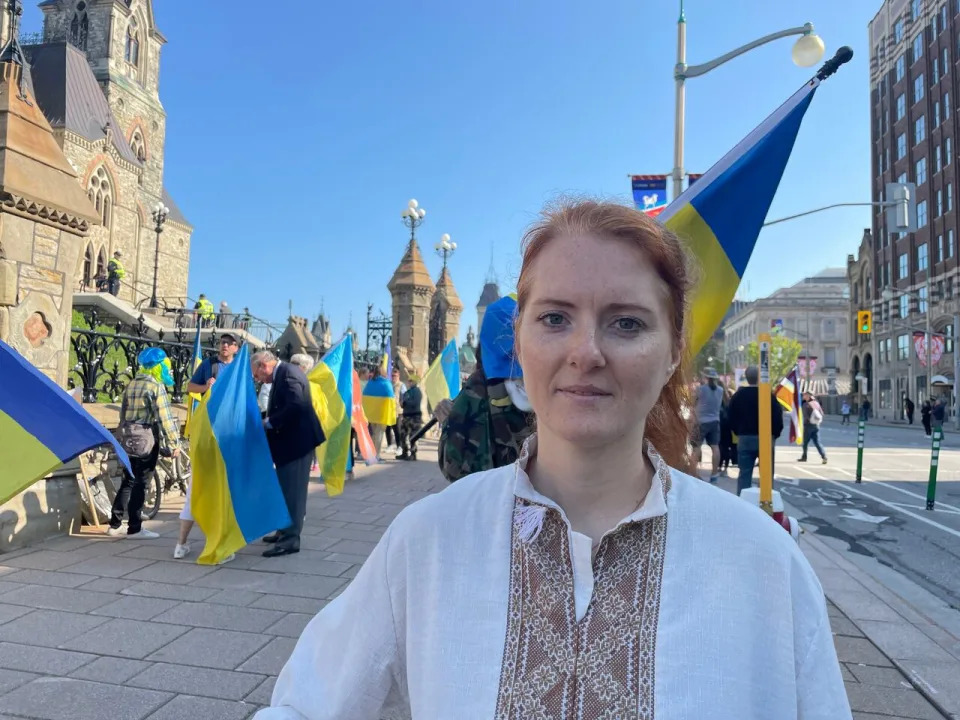
Juliia Baranova stands on Parliament Hill the day of Ukrainian President Volodymyr Zelenskyy's visit last week. Baranova says the warm welcome given to a Ukrainian veteran who fought for the Nazis has opened her eyes to the complicated history of many eastern European nations. (Avanthika Anand/CBC - image credit)
Some members of the local Ukrainian community say there's "broken trust" after a former Ukrainian solder who fought in a Nazi division was honoured in Parliament during President Volodymyr Zelenskyy's visit to Ottawa — and want an apology of their own.
"This is just so, so disappointing," said Jane Kolbe, an active member of the community in Ottawa.
Now-former House of Commons Speaker Anthony Rota invited veteran Yaroslav Hunka, one of his constituents from North Bay, Ont., to sit in the gallery during Zelenskyy's address on Sept. 22.
Hunka received a standing ovation from MPs, the prime minister and Zelenskyy himself.
Days later, it was revealed that Hunka was part of the First Ukrainian Division, also known as the Waffen-SS Galicia Division or the SS 14th Waffen Division — a voluntary unit under the command of the Nazis during the Second World War.
Members of Canada's Jewish community have called it a "humiliating debacle."
Rota resigned as Speaker last week, and Prime Minister Justin Trudeau publicly apologized to the Jewish community for what he called a "deeply embarrassing" moment in Canadian history.
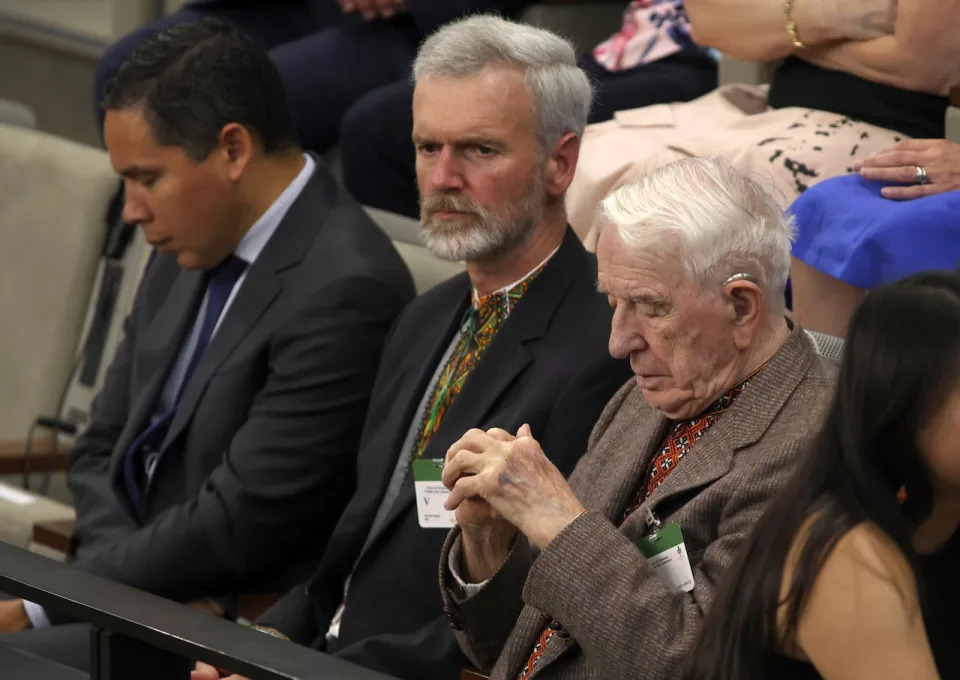
Yaroslav Hunka, right, waits for the arrival of Ukrainian President Volodymyr Zelenskyy in the House of Commons in Ottawa, Onatario, Friday, Sept. 22, 2023. Canadian Prime Minister Justin Trudeau apologized Wednesday, Sept. 27, for Parliament’s recognition of Hunka, who fought alongside the Nazis during last week’s address by Ukraine President Zelenskyy. “All of us who were in the House on Friday regret deeply having stood and clapped, even though we did so unaware of the context,” Trudeau said before entering the House of Commons.
Ukrainian-Canadian Yaroslav Hunka, 98, was a former soldier fought who fought alongside the Nazis. He was invited by former Speaker Anthony Rota to the House of Commons last week and received a standing ovation during Zelenskyy's visit. (Patrick Doyle/The Canadian Press)
As the incident made international headlines, some members of the Ottawa region's Ukrainian community said it's been "difficult" to watch it overshadow Zelenskyy's important visit.
Many are "still trying to absorb and understand" what happened, Kolbe said.
"It is baffling because [in] the diaspora, there's so many heroes to recognize," she said. "But this really wasn't the time to recognize heroes. This was the time to honour and reflect on President Zelenskyy's speech."
Kolbe said it was important that Trudeau apologized to the Jewish community, and believes the resulting "broken trust" with the Ukrainian diaspora in Canada means they deserve one, too.
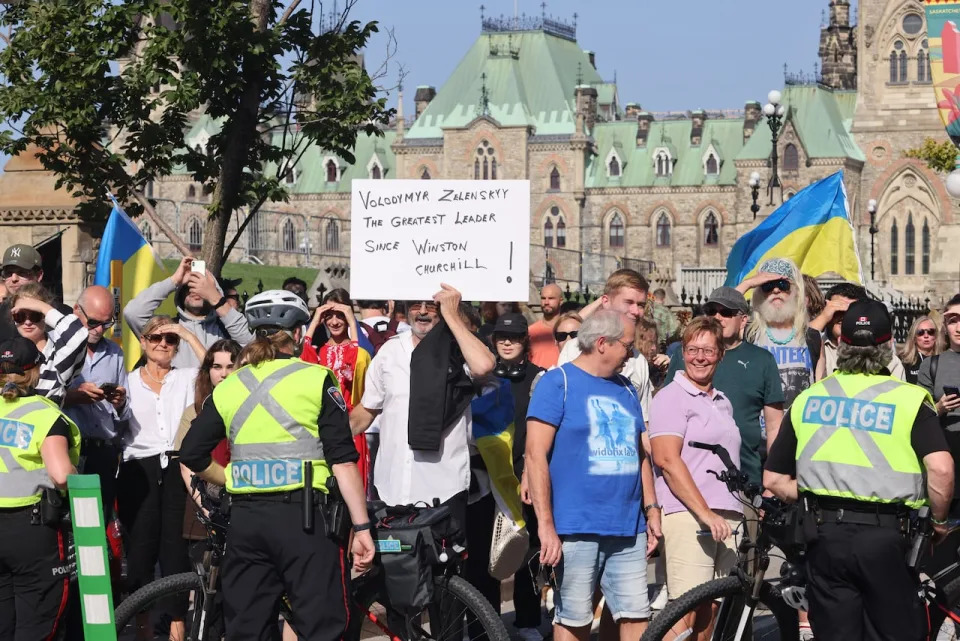
Supporters of the Ukraine stand in front of Parliament Hill as Ukrainian President Volodymyr Zelenskyy and Prime Minister Justin Trudeau attend a joint press conference in Ottawa on Friday, Sept. 22, 2023.
Supporters of the Ukraine stand in front of Parliament Hill during Zelenskyy's visit. (Patrick Doyle/The Canadian Press)
'History has a lot of complexity'
Juliia Baranova was among the hundreds of Ukrainians on Parliament Hill the day of Zelenskyy's visit and said she was "very concerned" about the Hunka incident.
"For me personally, it also shows that history lessons are not learned," Baranova said. "And eastern European countries' history has a lot of complexity."
Reports suggest as many as 2,000 Ukrainian members of Adolf Hitler's Waffen-SS were admitted to Canada after the war.
Historians have documented how soldiers like Hunka were trained at SS facilities in Germany, swore an oath to Hitler and received an education in Nazi doctrine.
But many young Ukrainian soldiers at that time were fighting not for Germany, but to expel the Russians occupying their country, said Dominique Arel, chair of Ukrainian Studies at the University of Ottawa.
The incident in the House of Commons has been made even worse, Arel added, by false Russian claims that the current invasion of Ukraine is a war against Nazism.
"No matter how you try to explain the complexity of history, the symbol is awful. It's shocking," he said.
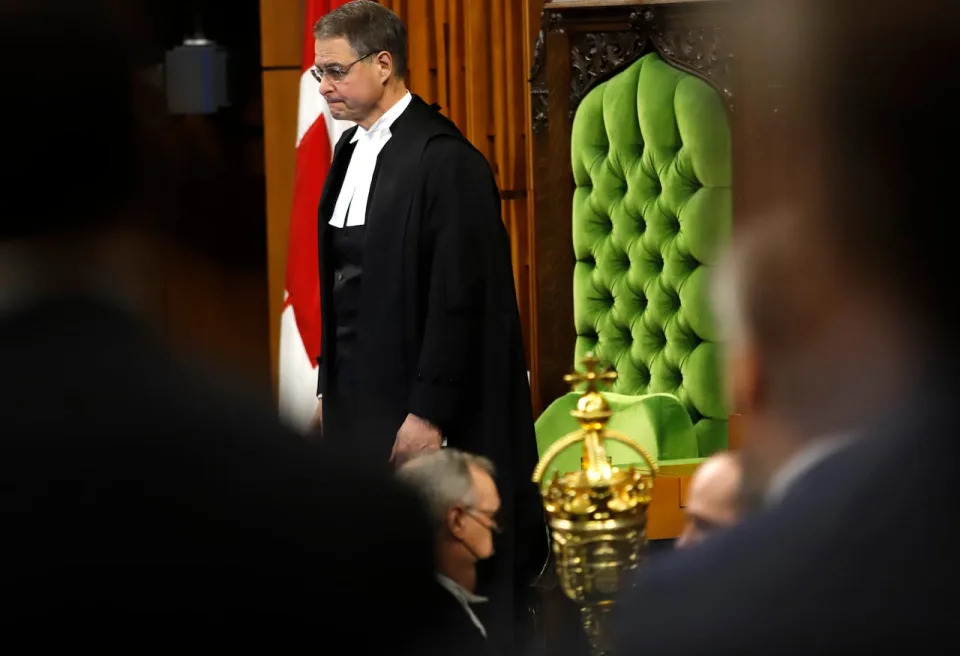
Speaker of the House of Commons Anthony Rota rises to speak in a December 2022 file photo. Rota invited Yaroslav Hunka, a 98-year-old Ukrainian-Canadian who now lives in North Bay, Ont., to witness Ukrainian President Zelenskyy's address to Parliament on Friday.
Rota resigned from his position as speaker last week following the incident. (Patrick Doyle/The Canadian Press)
Baranova, who was unaware of this history before last week, said despite its complexity, "we have to learn it."
Marina Lavow, who lives in Gatineau, Que., and moved to Canada from Ukraine nearly 30 years ago, called it a "really sad and unfortunate event" but noted that not everyone in the diaspora agrees.
"The community is not homogeneous," she said.
"There are different ways [of thinking], different generations. And to some people it means one thing, while to other people who have less knowledge of what happened, why that division was created, it means less."
CBC
Sun, October 1, 2023

Juliia Baranova stands on Parliament Hill the day of Ukrainian President Volodymyr Zelenskyy's visit last week. Baranova says the warm welcome given to a Ukrainian veteran who fought for the Nazis has opened her eyes to the complicated history of many eastern European nations. (Avanthika Anand/CBC - image credit)
Some members of the local Ukrainian community say there's "broken trust" after a former Ukrainian solder who fought in a Nazi division was honoured in Parliament during President Volodymyr Zelenskyy's visit to Ottawa — and want an apology of their own.
"This is just so, so disappointing," said Jane Kolbe, an active member of the community in Ottawa.
Now-former House of Commons Speaker Anthony Rota invited veteran Yaroslav Hunka, one of his constituents from North Bay, Ont., to sit in the gallery during Zelenskyy's address on Sept. 22.
Hunka received a standing ovation from MPs, the prime minister and Zelenskyy himself.
Days later, it was revealed that Hunka was part of the First Ukrainian Division, also known as the Waffen-SS Galicia Division or the SS 14th Waffen Division — a voluntary unit under the command of the Nazis during the Second World War.
Members of Canada's Jewish community have called it a "humiliating debacle."
Rota resigned as Speaker last week, and Prime Minister Justin Trudeau publicly apologized to the Jewish community for what he called a "deeply embarrassing" moment in Canadian history.

Yaroslav Hunka, right, waits for the arrival of Ukrainian President Volodymyr Zelenskyy in the House of Commons in Ottawa, Onatario, Friday, Sept. 22, 2023. Canadian Prime Minister Justin Trudeau apologized Wednesday, Sept. 27, for Parliament’s recognition of Hunka, who fought alongside the Nazis during last week’s address by Ukraine President Zelenskyy. “All of us who were in the House on Friday regret deeply having stood and clapped, even though we did so unaware of the context,” Trudeau said before entering the House of Commons.
(Patrick Doyle/The Canadian Press via AP, File)
Ukrainian-Canadian Yaroslav Hunka, 98, was a former soldier fought who fought alongside the Nazis. He was invited by former Speaker Anthony Rota to the House of Commons last week and received a standing ovation during Zelenskyy's visit. (Patrick Doyle/The Canadian Press)
As the incident made international headlines, some members of the Ottawa region's Ukrainian community said it's been "difficult" to watch it overshadow Zelenskyy's important visit.
Many are "still trying to absorb and understand" what happened, Kolbe said.
"It is baffling because [in] the diaspora, there's so many heroes to recognize," she said. "But this really wasn't the time to recognize heroes. This was the time to honour and reflect on President Zelenskyy's speech."
Kolbe said it was important that Trudeau apologized to the Jewish community, and believes the resulting "broken trust" with the Ukrainian diaspora in Canada means they deserve one, too.

Supporters of the Ukraine stand in front of Parliament Hill as Ukrainian President Volodymyr Zelenskyy and Prime Minister Justin Trudeau attend a joint press conference in Ottawa on Friday, Sept. 22, 2023.
Supporters of the Ukraine stand in front of Parliament Hill during Zelenskyy's visit. (Patrick Doyle/The Canadian Press)
'History has a lot of complexity'
Juliia Baranova was among the hundreds of Ukrainians on Parliament Hill the day of Zelenskyy's visit and said she was "very concerned" about the Hunka incident.
"For me personally, it also shows that history lessons are not learned," Baranova said. "And eastern European countries' history has a lot of complexity."
Reports suggest as many as 2,000 Ukrainian members of Adolf Hitler's Waffen-SS were admitted to Canada after the war.
Historians have documented how soldiers like Hunka were trained at SS facilities in Germany, swore an oath to Hitler and received an education in Nazi doctrine.
But many young Ukrainian soldiers at that time were fighting not for Germany, but to expel the Russians occupying their country, said Dominique Arel, chair of Ukrainian Studies at the University of Ottawa.
The incident in the House of Commons has been made even worse, Arel added, by false Russian claims that the current invasion of Ukraine is a war against Nazism.
"No matter how you try to explain the complexity of history, the symbol is awful. It's shocking," he said.

Speaker of the House of Commons Anthony Rota rises to speak in a December 2022 file photo. Rota invited Yaroslav Hunka, a 98-year-old Ukrainian-Canadian who now lives in North Bay, Ont., to witness Ukrainian President Zelenskyy's address to Parliament on Friday.
Rota resigned from his position as speaker last week following the incident. (Patrick Doyle/The Canadian Press)
Baranova, who was unaware of this history before last week, said despite its complexity, "we have to learn it."
Marina Lavow, who lives in Gatineau, Que., and moved to Canada from Ukraine nearly 30 years ago, called it a "really sad and unfortunate event" but noted that not everyone in the diaspora agrees.
"The community is not homogeneous," she said.
"There are different ways [of thinking], different generations. And to some people it means one thing, while to other people who have less knowledge of what happened, why that division was created, it means less."
Rota debacle renews calls to examine history, including war crime records
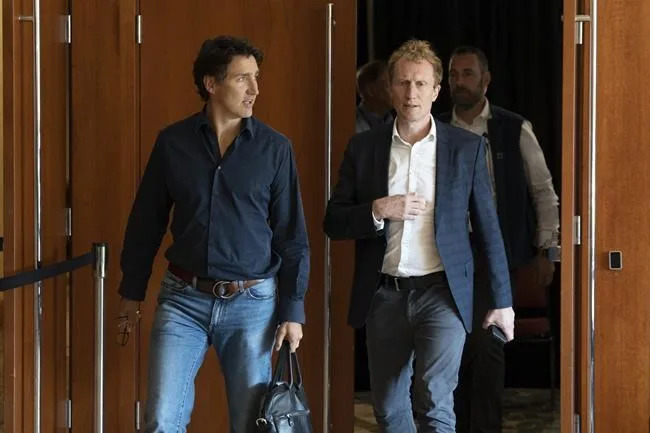
OTTAWA — Canada could revisit calls to declassify documents about the presence of Nazi war criminals in the country, Immigration Minister Marc Miller said Wednesday, as the fallout continued over Parliament's recognition last week of a man who fought for the Nazis.
"Canada has a really dark history with Nazis in Canada," Miller said, heading into the weekly Liberal caucus meeting.
"There was a point in our history where it was easier to get (into Canada) as a Nazi than it was as a Jewish person. I think that's a history we have to reconcile."
Many Jewish organizations in Canada say doing that requires a public airing of information, and that means all the records Canada has about the presence of war criminals must be opened up.
"I think part of the problem here is that the records are closed," said B'nai Brith senior lawyer David Matas in an interview.
"You can't remember the past unless you know the past, and you can't know the past unless you get the records."
B'nai Brith Canada and the Friends of Simon Wiesenthal Center both reiterated their long-standing calls this week for the government to make public all records about the admittance of former Nazi soldiers.
That includes the entirety of a 1986 report from a public commission on war criminals, which is often referred to as the Deschênes Commission for the judge who led it.
The report has never been fully released, including an appendix with the names of 240 alleged Nazi war criminals who might be living in Canada that the report recommended Canada investigate.
"It's now time for Ottawa to not only release the unredacted files related to the Deschênes Commission, but to also address the stark reality that there are still former Nazis with blood on their hands living in Canada," said Friends of Simon Wiesenthal Center President Michael Levitt.
Matas noted that in June, a House of Commons committee studying Canada's access-to-information system recommended all historical documents be released in full after 25 years.
He said implementing that recommendation would fulfil the desire to see Canada's war criminal records.
Currently, records can be released 20 years after someone's death. But Matas said that rule doesn't apply in this case, because information about people who died can't be accessed unless their names are available.
He said it's not that every person named in the records is guilty, but that a justice system relies on openness, and you can't have justice without transparency, whether you're guilty or innocent.
There is also little to no information publicly available about what follow-up was done to investigate alleged war criminals named in the Deschênes report, or bring any of them to justice.
All of this comes after what some have called the most embarrassing international debacle in Canadian history.
On Friday, during an official visit by Ukraine President Volodymyr Zelenskyy, the House of Commons Speaker pointed to a guest in the gallery he identified as a war hero.
Parliamentarians and dignitaries who were present gave two standing ovations to a 98-year-old Ukrainian Canadian war veteran without knowing or understanding that the unit he fought with was formed by Nazi Germany to fight against the Soviet Union.
Speaker Anthony Rota, who said he did not know about Yaroslav Hunka's background, apologized for making an egregious mistake inviting him to Parliament. He announced Tuesday that he would resign from the role.
On Wednesday, Prime Minister Justin Trudeau issued an apology on behalf of Canada and all parliamentarians for the debacle.
University of Alberta professor John-Paul Himka pointed out that nobody seemed to immediately understand how Hunka's military history implied he would have fought with the Germans.
That's because of a great lack of understanding of history, even among elected MPs, he said.
"I mean, this man was introduced as somebody who fought the Russians during World War II. Who was fighting the Russians during World War II? It was the Germans," he said.
Matas concurred.
"I mean if Rota didn't know about this whole issue and he was the Speaker of the House of Commons, you can imagine how widespread the ignorance is," he said.
Still, said Matas, the uproar has rejuvenated the discussion about exposing that history, including all the records.
"This is on the radar, now, I think," he said. "They're paying attention to it."
Miller said he has read the Deschênes report twice since this all happened, and encouraged all Canadians to do so.
He also said he knows there are many people demanding the release of the records, and it is something the government "could possibly examine again."
But he said because he doesn't know exactly what is contained in the documents, he doesn't yet want to say if he backs their full release.
"But again, in a country like Canada that has not only a difficult history with Nazis in Canada, but also one of the most important diaspora of Jewish people, including some of the largest proportions of Holocaust survivors, impunity is absolutely not an option," he said.
Mental Health Minister Ya'ara Saks, whose York Centre riding in Toronto has about one-fifth of its population identifying as Jewish, said Canada should look at what it can do to help provide answers and closure to Jewish Canadians.
She said opening the records is something to be looked at.
This report by The Canadian Press was first published Sept. 27, 2023.
Mia Rabson, The Canadian Press

OTTAWA — Canada could revisit calls to declassify documents about the presence of Nazi war criminals in the country, Immigration Minister Marc Miller said Wednesday, as the fallout continued over Parliament's recognition last week of a man who fought for the Nazis.
"Canada has a really dark history with Nazis in Canada," Miller said, heading into the weekly Liberal caucus meeting.
"There was a point in our history where it was easier to get (into Canada) as a Nazi than it was as a Jewish person. I think that's a history we have to reconcile."
Many Jewish organizations in Canada say doing that requires a public airing of information, and that means all the records Canada has about the presence of war criminals must be opened up.
"I think part of the problem here is that the records are closed," said B'nai Brith senior lawyer David Matas in an interview.
"You can't remember the past unless you know the past, and you can't know the past unless you get the records."
B'nai Brith Canada and the Friends of Simon Wiesenthal Center both reiterated their long-standing calls this week for the government to make public all records about the admittance of former Nazi soldiers.
That includes the entirety of a 1986 report from a public commission on war criminals, which is often referred to as the Deschênes Commission for the judge who led it.
The report has never been fully released, including an appendix with the names of 240 alleged Nazi war criminals who might be living in Canada that the report recommended Canada investigate.
"It's now time for Ottawa to not only release the unredacted files related to the Deschênes Commission, but to also address the stark reality that there are still former Nazis with blood on their hands living in Canada," said Friends of Simon Wiesenthal Center President Michael Levitt.
Matas noted that in June, a House of Commons committee studying Canada's access-to-information system recommended all historical documents be released in full after 25 years.
He said implementing that recommendation would fulfil the desire to see Canada's war criminal records.
Currently, records can be released 20 years after someone's death. But Matas said that rule doesn't apply in this case, because information about people who died can't be accessed unless their names are available.
He said it's not that every person named in the records is guilty, but that a justice system relies on openness, and you can't have justice without transparency, whether you're guilty or innocent.
There is also little to no information publicly available about what follow-up was done to investigate alleged war criminals named in the Deschênes report, or bring any of them to justice.
All of this comes after what some have called the most embarrassing international debacle in Canadian history.
On Friday, during an official visit by Ukraine President Volodymyr Zelenskyy, the House of Commons Speaker pointed to a guest in the gallery he identified as a war hero.
Parliamentarians and dignitaries who were present gave two standing ovations to a 98-year-old Ukrainian Canadian war veteran without knowing or understanding that the unit he fought with was formed by Nazi Germany to fight against the Soviet Union.
Speaker Anthony Rota, who said he did not know about Yaroslav Hunka's background, apologized for making an egregious mistake inviting him to Parliament. He announced Tuesday that he would resign from the role.
On Wednesday, Prime Minister Justin Trudeau issued an apology on behalf of Canada and all parliamentarians for the debacle.
University of Alberta professor John-Paul Himka pointed out that nobody seemed to immediately understand how Hunka's military history implied he would have fought with the Germans.
That's because of a great lack of understanding of history, even among elected MPs, he said.
"I mean, this man was introduced as somebody who fought the Russians during World War II. Who was fighting the Russians during World War II? It was the Germans," he said.
Matas concurred.
"I mean if Rota didn't know about this whole issue and he was the Speaker of the House of Commons, you can imagine how widespread the ignorance is," he said.
Still, said Matas, the uproar has rejuvenated the discussion about exposing that history, including all the records.
"This is on the radar, now, I think," he said. "They're paying attention to it."
Miller said he has read the Deschênes report twice since this all happened, and encouraged all Canadians to do so.
He also said he knows there are many people demanding the release of the records, and it is something the government "could possibly examine again."
But he said because he doesn't know exactly what is contained in the documents, he doesn't yet want to say if he backs their full release.
"But again, in a country like Canada that has not only a difficult history with Nazis in Canada, but also one of the most important diaspora of Jewish people, including some of the largest proportions of Holocaust survivors, impunity is absolutely not an option," he said.
Mental Health Minister Ya'ara Saks, whose York Centre riding in Toronto has about one-fifth of its population identifying as Jewish, said Canada should look at what it can do to help provide answers and closure to Jewish Canadians.
She said opening the records is something to be looked at.
This report by The Canadian Press was first published Sept. 27, 2023.
Mia Rabson, The Canadian Press
No comments:
Post a Comment